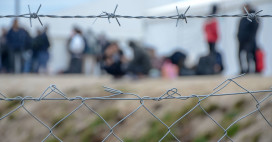
A no man land: The Protocol on extraterritorial migration management between the Republic of Albania and Italy to welcome illegal emigrants
The “Protocol on extraterritorial migration management between the Government of the Italian Republic and the Council of Ministers of the Albanian Republic" is an agreement signed last November 6th, 2023, between Albania and Italy based on the Treaty on Friendship between two countries.
What is this treaty about?
As of the time of writing this blog post, the new Protocol between Italy and Albania allows Italy to establish two detention centers in Lezha, Albania. These centers will hold up to 3,600 male migrants deemed “illegal” while their asylum applications undergo final review. Italian authorities will manage the centers internally, while Albanian police will be responsible for securing the outside perimeter. Notably, Italian officers will be exempt from Albanian law. The migrants will be confined within the centers with no right to leave. All services, including those related to their asylum claims, will be provided by Italian authorities. Additionally, a separate detention facility with a capacity of 20 people will be built to function as a prison.
What are the possible human rights implications?
The agreement between Italy and Albania to establish detention centers in Albania raises several critical legal and human rights concerns:
- Limited Access to Justice: Migrants will be unable to effectively access Albanian courts and struggle to find legal representation due to jurisdictional limitations and Italian control over access. Albanian lawyers will not be permitted to practice their profession, as they would need to be licensed under Italian law to represent these migrants, which practically excludes them from entering the centers. Italian lawyers, on the other hand, will have the authority to practice in the Republic of Albania, subject to approval by both Albanian authorities responsible for the perimeter and Italian authorities overseeing the centers. However, there is concern that Italian lawyers may bypass Italian authorities by seeking approval from Albanian officials. Furthermore, transferring migrants to Italy for court hearings would contradict fundamental rights guaranteed under the Italian Constitution, rendering such actions impractical and contrary to the objectives of the treaty.
- Potential Human Rights Violations: Confining many people with restricted access to lawyers, courts, and human rights organizations creates a high risk of abuse. This situation raises serious concerns regarding the principle of ‘ne bis in idem’, which guarantees protection against double jeopardy.
- Unclear Jurisdiction: The agreement leaves the question of criminal investigation and prosecution ambiguous, potentially creating a legal “no man’s land” where violations go unpunished.
- Separation of Families: Separating men from their families during the asylum process violates family rights and could be considered degrading treatment.
- Inconsistency with National and International Law: The treaty appears to contradict both Albanian and Italian domestic law, as well as international human rights standards. While the Protocol stipulates that Italy assumes full responsibility for any damages incurred by the Republic of Albania, the latter cannot be absolved from accountability under international law.
- Questionable Role of the Albanian Constitutional Court: The Court’s approval of the treaty despite these concerns raises doubts about its commitment to upholding the Albanian constitution.
What can be done?
The only potential legal challenge seems to be through the European Court of Human Rights (ECtHR). However, applications from public entities in Albania are unlikely. The Albanian People’s Advocate, a human rights watchdog, could potentially file a case, potentially setting a new legal precedent. While an inter-state application (one country suing another) is also possible, current EU political trends seem to favor these external migrant detention centers, making this unlikely. This leaves applications from NGOs as the most realistic option, but the outcome remains uncertain. Additionally, the Court of Justice of the European Union (CJEU) could be involved, but only if a violation of EU law is claimed.

